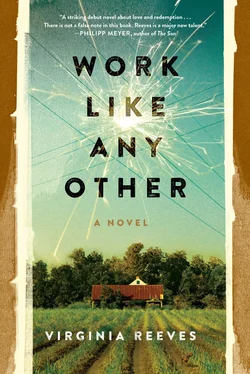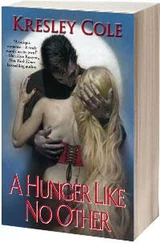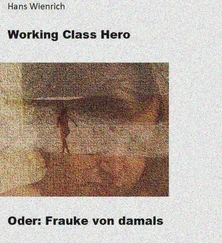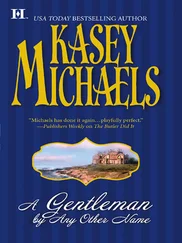“Where’s Henry?”
“He’s married.” She smiled. “And he has a little girl that he named after Mama. She’s six months old and the most beautiful thing. He’s sent a photograph.”
“And where is he?”
Her face returned to its quiet melancholy. “They’re in New York City. Mama and Papa are very proud. Ms. Marie helped him get into college, like Gerry, and he has a real job there as a teacher. Ms. Marie sent us all up on the train to see his graduation.”
That would’ve been about a year before.
“And why haven’t you left, Miss Jenny?”
“I’m not book-smart like Henry. I like this work.” She reached again for Maggie’s ears.
“Listen, next time you bring my supper, bring some paper and a pencil, too. I know who we can write to at the prison to find out about Charles.”
“Thank you, Mr. Roscoe.” She kept herself back for a moment and then stepped over Maggie to give me a wide embrace. I hadn’t held a woman of any color or age or size for nine years, and I didn’t know what to do with my body. She pulled away as quickly as she’d come forward. “I’m sorry,” she said, smoothing out her skirt. “Will you stay? Will you stay here until we find out?”
“Yes, of course.”
“Good. I best get back, now. I’ll bring that paper and pencil as soon as I can.”
“Jenny,” I said before she started off, “do you know why I’m here?”
She was quiet as her father had been when I’d asked a similar question, and I expected her reply to be vague and hazy, but instead she said, “I suppose it’s because this is your home, Mr. Roscoe.”
She headed down the trail toward the big house, and just before she vanished, she yelled, “What would you like for supper tomorrow?”
I was thinking about homes. “Anything. Anything you and your mama want to cook.”
INSIDEthe cottage, my body was all memory. I couldn’t recollect the specifics of Jenny’s touch, only the roar of it. I wanted that girl’s arms around me again, and then once more every day after. I didn’t know how much I’d needed a simple embrace.
That feeling has finally lessened some.
Ashamed, I unwrapped our supper package and scraped Maggie’s portion into the pie tin that served as her bowl. Then I fell to my own dinner, not realizing my hunger.
Idug my holes, all three, and I bolted the crossarms firm in their notches.
“You’ll need help,” Wilson told me the morning I planned to put the poles up, surprising me with his appearance in the meadow.
“What are you doing here?”
“Jenny’s been giving us updates.”
“She your spy?”
“She speaks highly of you, Ross.”
“That’s kind of her.”
I’d numbered my poles and laid them out in order, each gently decreasing in height as it neared the cottage. Wilson joined me at the first and said, “You take the arm. I’ll get the end. I’m the one holding it up, though. No way I’m packing in the ground.”
“I have braces. They can hold it while I tamp.”
He lifted his end and anchored it against his side. The ghost of his left forearm and hand reached forward, sliding down. “Get your side.”
Wilson had been my woodworker when we raised poles along the north field. He’d felled the trees and stripped them, cut the crossarms, notched the poles, bolted the arms in place. I’d held the poles while Wilson filled in the dirt.
“Already leaning to the right,” Wilson said. “Too far left. Just a bit now. Too much again.”
“We have time for final tweaks.”
“You’re the one who wanted them straight at the start.”
“Yes, I remember.”
That was all we said about it.
He held the pole, his left arm applying pressure from the front while his right hand wrapped round the back, and I settled into a quick rhythm — six shovelfuls, then tamping two times round the circle. Shovel, tamp, again. When the hole was half-full, the pole stood on its own.
Wilson stepped away. “Looks plum. Straighter than the tree it was before.”
Filling the hole wasn’t as bad as the digging, but the tamping jolted my weak shoulder. The next two would leave me broken by the day’s end.
“You act like you know what you’re doing, Ross.” Wilson leaned against a pine. “You dig some holes at Kilby?”
“None this deep.”
“How’s it you knew how deep to make these ones?”
In between blows with the bar I said, “I’m a keen observer.”
Wilson chuckled. “The tamping wasn’t mine to do at Flat Top. Powder was the property of the white folks. Couldn’t trust none of us with the explosives. I’d drill their holes, get it all good and ready, but then some fellow from ground level would come running down with his fuses and cotton and charges. We weren’t far up the shaft when those charges would go.”
I had been waiting for this, for Wilson to show me his time underground. “How long were you in the mines?”
“Just under three years.”
Wait, my mind said. Wait . We’d been convicted in ’22, and the leasing stopped in ’28. I’d pictured Wilson working or dead in those mines for at least six years, sitting with the knowledge that I’d put him there, that I’d written him those long, dark days. My guilt had let me live a bit easier with Marie’s silence. I’d cost a man his family. What right did I have to one of my own?
But he’d been gone only three years, a third of my time.
“I met a fellow who was over in the Peerless mine when it blew,” Wilson was saying. “Sparks from a saw set that one off. His name was Conrad, and he was hoping on a homeward ticket, what with his burns, but they just patched him a bit and shuffled him off to Flat Top. It’s only if you can’t do the work anymore that they let you go, and only then if they don’t have the papers to hold you.”
I rested the bar against my chest and looked at him.
“Best finish that hole off. Got two more, if I counted right.”
“That’s right.” I was nearly done. Scoop, I told my arms. Pitch. Scoop . And then, Set the shovel down. Grab the bar. Hold it firmly, damn it. Hold it. Now, strike. Again. Even with Wilson there, it was just work — work like any other, like milking and cleaning stalls, building pens and running dogs, rolling carts down narrow aisles, organizing cards, memorizing numbers. It was picking at coal veins on your side and breathing rushes of coal dust, awaiting explosions, lifting and loading. It was tamping and shoveling and pitching. And work is measured in time as much as it is measured in pay. I am uncertain how many hours of running equal a man’s hand, his wrist, and forearm and elbow. How many books must be stacked in exchange for one finger? How much milk driven into a pail? How many holes dug, how many dogs pulled from the ground and then buried back even deeper? How many wives and sons?
I am still unsure of my debts.
I finished up and moved to the second hole. Wilson was talking now, more than I’d heard. “There are these stories that are passed round the mining camps.” We walked with the second pole. My right arm was battening itself down, the shoulder tightening its leash. I wouldn’t be able to turn my head the next day. “All the stories from all the mines that’ve come and gone. All those men bought from the State. It’s like ghost stories. Watch that stump there. That one of the ones you cut down?”
I shook my head and stepped around it.
“Like the Banner mine,” he said.
I’d been the first person to tell Wilson about the Banner mine, passing it along as the curse it was.
I turned the pole over to Wilson and set to shoveling. Our shared knowledge of Banner didn’t have anything to do with the time Wilson and I had served or the new time we were serving together, there on the farm.
Читать дальше












